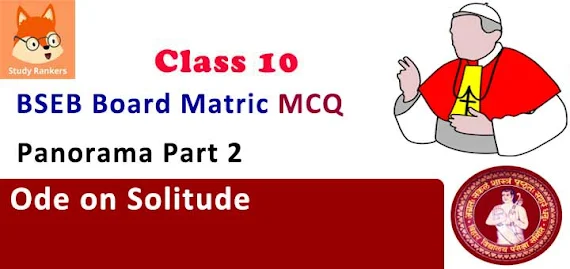MCQ Questions Answers and Summary for Ode on Solitude Class 10 English Panorama Part 2 Bihar Board
Ode on Solitude - Alexander Pope MCQ and Summary
Chapter Name | Multiple Choice Questions for Ode on Solitude |
Author Name | Alexander Pope |
Related Study |
|
Book Name | Panorama Part 2 |
Short Summary for Ode on Solitude by Alexander Pope
- In the present poem, the poet draws a beautiful picture of a happy man.
- According to the poet, the man who is satisfied with a few acres of land inherited from his forefather is happy.
- He lives in a native land.
MCQ Questions for Ode on Solitude Class 10 English Matric
1. A poem written in fourteen lines is called ____
(A) anode
(B) an elegy
(C) a sonnet
(D) a lyric
Answer
(C) a sonnet
2. In the poem 'Ode On Solitude' the poet draws a beautiful picture of ____
(A) a Village
(B) a poor man
(C) a happy man
(D) a town
Answer
(C) a happy man
3. Pope, in the poem 'Ode on Solitude', says that village people get everything except ____
(A) Milk from herds
(B) Bread from fields
(C) Attire from flocks
(D) Money from trees
Answer
(D) Money from trees
4. In the poem 'Ode On Solitude', where is the happy man content to live?
(A) in town
(B) in his own ground
(C) in the heaven
(D) in an orchard
Answer
(B) in his own ground
5. According to the poet of 'Ode On Solitude', a happy man is satisfied with ____
(A) a few acres of inherited land
(B) more acres of inherited land
(C) a few acres of inherited money.
(D) a lot inherited property
Answer
(A) a few acres of inherited land
6. Alexander Pope was one of the greatest ____
(A) dramatist
(B) novelist
(C) essayist
(D) satirist
Answer
(D) satirist
7. Who gives milk to the happy man?
(A) Cattle
(B) Cow
(C) Buffalo
(D) Camel
Answer
(A) Cattle
8. In the poem 'Ode on Solitude', the poet draws a beautiful picture of a ____man.
(A) unhappy
(B) sad
(C) happy
(D) cruel
Answer
(C) happy
9. Alexander Pope was one of the greatest satirist of the early ____ century.
(A) 18th
(B) 19th
(C) 20th
(D) 16th
Answer
(A) 18th
10. When does a happy man get sleep?
(A) At night
(B) During the day
(C) During the morning
(D) During the evening
Answer
(A) At night
11. The Poet wants to live unseen and ____
(A) painfully
(B) unknown
(C) quietly
(D) publicly
Answer
(B) unknown
12. In Ode On Solitude, the poet says that a happy man wants to ____ unlamented.
(A) sleep
(B) think
(C) die
(D) live
Answer
(C) die
13. Happy man has no ____
(A) health
(B) land
(C) money
(D) care
Answer
(D) care
14. Meditation ____the happy man.
(A) pleases
(B) sadness
(C) worries
(D) angry
Answer
(A) pleases
15. A happy man is satisfied by the property inherited by him from his ____
(A) mother
(B) uncle
(C) father
(D) cousin
Answer
(C) father
16. Alexander Pope was also a ____
(A) thinker
(B) philosopher
(C) critic
(D) reformer
Answer
(C) critic
17. From where does he get his clothes ?
(A) from leather of animals
(B) from cultivation
(C) from woods
(D) from his flocks and sheep
Answer
(D) from his flocks and sheep
18. The Poet does not want to mark the place where he is ____
(A) sitting
(B) hiding
(C) crying
(D) buried
Answer
(D) buried
19. The poet is content to breathe his ___
(A) fresh air
(B) native air
(C) open air
(D) none of these
Answer
(B) native air
20. The poet enjoys shades of trees in ____
(A) winter
(B) summer
(C) rainy season
(D) autumn
Answer
(B) summer
21. A happy man spends his time ____
(A) growing crops
(B) playing cricket
(C) studying books
(D) enjoying travelling
Answer
(C) studying books
22. What does the poet wish after death?
(A) No body expresses sorrow
(B) To place tomb stone
(C) No rest
(D) None of these
Answer
(A) No body expresses sorrow
23. Alexander Pope was born in ____
(A) 1666
(B) 1668
(C) 1688
(D) 1680
Answer
(C) 1688
24. Ode is a poem ____
(A) addressed to a person
(B) addressed to a gentleman
(C) addressed to a lady
(D) addressed to a unknown man
Answer
(A) addressed to a person
25. What is meant by 'herds'?
(A) People
(B) Cattle
(C) Group
(D) Gang
Answer
(B) Cattle
26. How does the poet desire to sleep?
(A) soundly
(B) comfortly
(C) luxuriously
(D) soflty
Answer
(A) soundly
27. A happy man enjoys sound sleep at ____
(A) evening
(B) morning
(C) night
(D) day
Answer
(C) night
28. Who gives a happy man his bread ?
(A) His bakery
(B) His trees
(C) His fields
(D) His herds
Answer
(C) His fields
29. According to the poet, a happy man is one who ____
(A) is strong
(B) has a car
(C) is content
(D) is rich
Answer
(C) is content
30. The poet is 'Ode on Solitude' wants to live ____
(A) seen
(B) unseen
(C) remembered
(D) praised
Answer
(B) unseen
31. The happy man is ____ to breathe his native air.
(A) content
(B) sad
(C) cruel
(D) unable
Answer
(A) content
32. 'Ode on Solitude' has been written by ____
(A) Walter de la Mare
(B) John Keats
(C) William Wordsworth
(D) Alexander Pope
Answer
(D) Alexander Pope
33. According to Pope, a man is happy he is ____
(A) rich
(B) contented
(C) famous
(D) poor
Answer
(B) contented

